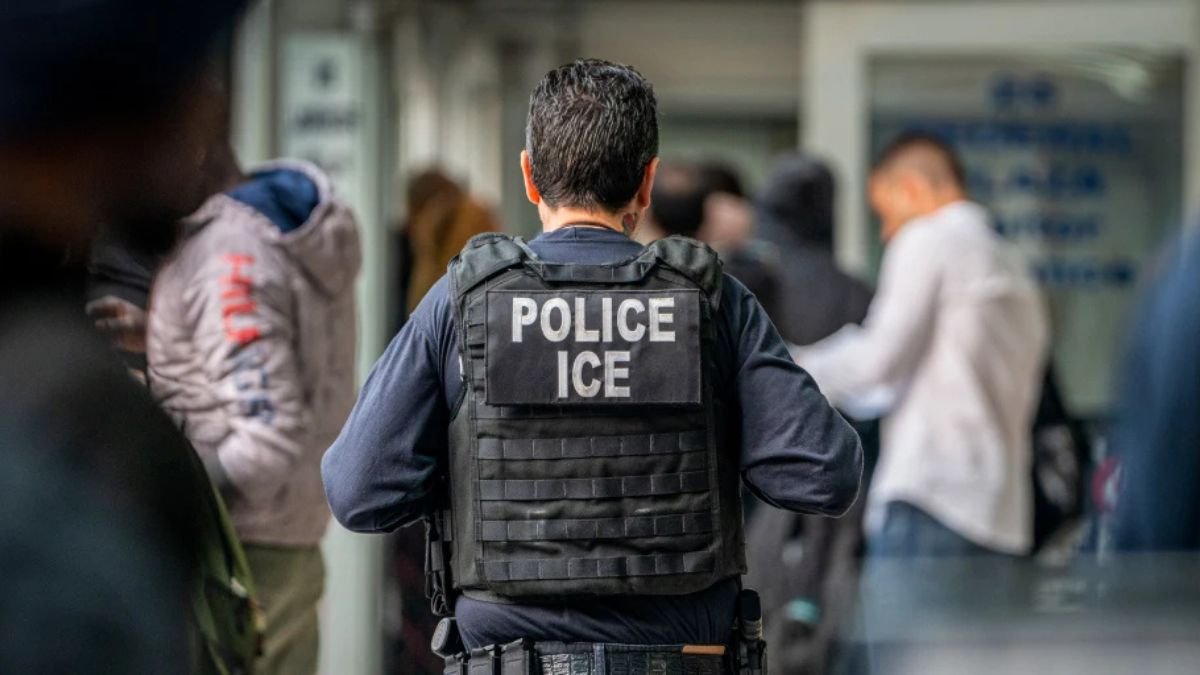Immigration has always been a sensitive issue in US politics and administration. Ever since Donald Trump assumed the presidency, his policies have focused on border security and taking a tough stand on illegal immigrants. Now the Trump administration has taken another big step and announced to increase the operations of ICE (Immigration and Customs Enforcement) in the city of Chicago.
This step is not just a matter of security, but politics, electoral strategy, and social impact are also linked to it. Let us know this entire incident in detail in 10 main points.
What is ICE and why is its role important?
ICE i.e. Immigration and Customs Enforcement is a major agency of America, whose job is to monitor immigrants living illegally in the country and take action against those who break the law.
Its job is also to stop cross-border crime, human trafficking, drugs and illegal arms supply.
The presence of ICE in big cities like Chicago has a direct impact on migrant communities.
Why was Chicago chosen?
Chicago is the third largest city in the US, and a large number of Latino and Asian immigrant communities live here.
It is believed that the number of illegal immigrants is high here.
The city has a “Sanctuary City” policy, that is, the local administration avoids handing over illegal immigrants directly to federal agencies.
For this reason, the Trump administration has specifically targeted Chicago.
Trump’s immigration policy and pressure on Chicago
Donald Trump had promised since the 2016 election that he would show zero tolerance on “Illegal Immigration”.
Announcement of building a wall (Mexico Border Wall)
“Catch and Deport” policy
And now the increase in ICE resources – all this is part of the same strategy.
By choosing Chicago, they want to send a message that no city is above federal orders.
Reaction of local leaders
The mayor of Chicago and local leaders have opposed this move.
They say that this will spread fear and insecurity among migrant families.
Under the “Sanctuary City” law, Chicago claims to protect migrants, but the Trump administration challenges it.
This conflict has further intensified the tussle between the local and federal government.
Impact on the migrant community
- The biggest impact will be on millions of migrants living in Chicago.
- Many migrant families have been living there for years, their children are American citizens.
- With the increase in ICE operations, the risk of raids, arrests and deportation has increased.
This also leads migrants to distance themselves from education, jobs and health services because they fear being caught.
Human rights and moral questions
- This issue is not just related to politics, but also to human rights.
- Critics say that breaking up families and separating children from their parents is inhuman.
- Sometimes people are deported just because of minor crimes or lack of documents.
This is the reason why human rights organizations have strongly opposed the policies of the Trump administration.
The argument of law and order
- The Trump administration says that strengthening ICE is necessary to restore law and order.
- They claim that many criminals hide in the illegal immigrant crowd.
- Increasing ICE operations will stop gang crime, drugs and violence.
But opponents say that this argument is just a means to advance a political agenda.
Preparation for electoral politics
This step is also related to the upcoming elections.
Trump repeatedly tries to build the image of a “Law and Order President”.
By targeting cities like Chicago, he sends a message to his supporters that he is a tough and decisive leader.
This strategy helps him get support among rural and white voters.
Public opinion
Different opinions can be seen on the streets of Chicago.
Some people say that ICE’s intervention is necessary to reduce crime.
While many people call it politics that divides society and spreads fear.
Especially American citizens of immigrant origin also consider it an attack on their community.
Way forward
It is clear that ICE’s presence in Chicago will increase further.
This will affect immigrants, local politics and the national debate in America.
The question is whether this step will actually reduce crime, or is it just a strategy to fulfill election promises?
Conclusion
Increasing ICE operations in Chicago is a tough and controversial step by the Trump administration.
While on the one hand supporters consider it a victory for security and law and order, on the other hand critics call it a violation of human rights and a political gimmick.
FAQs
Q1. What does ICE stand for?
A. ICE stands for U.S. Immigration and Customs Enforcement, a federal agency responsible for enforcing immigration laws, investigating customs violations, and ensuring border security.
Q2. Why is the Trump administration increasing ICE operations in Chicago?
A. The Trump administration expanded ICE operations in Chicago to address illegal immigration, enforce deportation orders, and crack down on undocumented immigrants with criminal records.
Q3. How will the increase in ICE resources affect Chicago residents?
A. For undocumented immigrants, this may lead to heightened fear of raids and deportation. For legal residents, it may create mixed reactions—some see it as improving law enforcement, while others view it as creating division and fear in immigrant communities.
Q4. Which communities are most impacted by this move?
A. Primarily immigrant communities in Chicago, especially Hispanic and South Asian populations, are directly affected, as they have higher numbers of undocumented residents.
Q5. What has been the reaction of Chicago officials?
A. Chicago leaders, including the mayor and city council, have criticized the move, stating that it undermines the city’s sanctuary city policies and creates unnecessary fear among immigrants.
